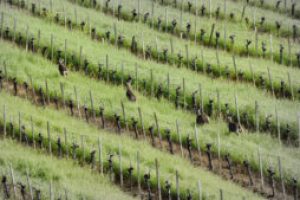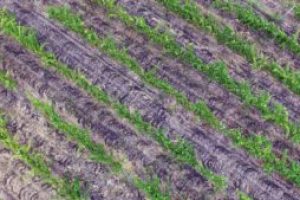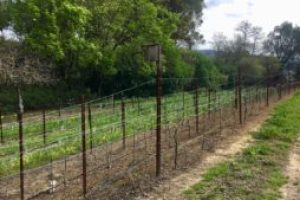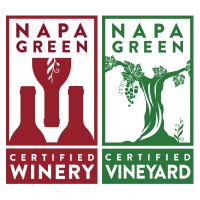SUSTAINABILITY LEADERSHIP PILLAR:
Integrated Pest Management & Pesticide Phaseout
More and more we want to turn to nature as an ally, maximizing Integrated Pest Management (IPM). This means using cover crops that attract beneficial insects that eat the nasty bugs we don’t want in the vineyard, or even releasing vineyard-friendly insects like ladybugs. This also includes putting up bluebird and owl boxes and raptor perches, to help with bugs, rodents, and scare away unwelcome birds that eat the grapes, like starlings.
We also have to recognize that “weeds” are a human construct. Sometimes we are battling weeds for purely aesthetic reasons. In the farm setting, we need to return to seeing some “wild” as beautiful.
Here are some examples of other ways sustainable winegrape growers are limiting or eliminating the use of synthetic pesticides:
- 13 of the growers transitioning to the cutting-edge Napa Green Vineyard certification are “GOLD LEVEL,” meaning Herbicide Free and Bee Kind (the latter means no use of neonicotinoids that can harm bees and butterflies)
- Using mechanical and cultural tools (as in muscle with shovel) to clear weeds
- Growers using regenerative practices (e.g., cover crops, compost, reduced tillage, reduced pesticide and fertilizer use) to maximize soil and plant health have seen increased resilience to viruses
- Introducing rotational grazing of sheep, who serve as natural lawn mowers and add nutrients to the soil (as in scat)
- Planting insectaries, preserving and restoring riparian and forest habitat, and other ways of increasing biodiversity in the vineyard
- Strictly limiting or eliminating the use of rodenticides
*Pesticides is a term that encompasses insecticides, fungicides, rodenticides and herbicides (used to combat weeds that can compete with vines for water and nutrients).
Inglenook Champion Story
In the 1980’s, when we were reviving the Inglenook estate, we committed to organic farming practices. In 1994 we were among the first growers in the Napa Valley to have our estate vineyards certified organic. Our vineyard team is focused on the ecological stability of the whole farm system, with long-term practices that build soil and vine health, which buffers against pests, disease, drought and other extreme conditions. Our Vineyard Supervisor, Francisco Ortega, has been with us since 1984, and most of the crew has been here for a decade or more. They’ve watched everything grow, they understand particular issues in each area, and they cultivate natural defenses. This includes welcoming natural predators – releasing beneficial mites, installing bluebird, bat and owl boxes. Our Director of Vineyard & Cellar Operations, Enrique Herrero, feels that the careful attention and vigilance in the vineyard, with each vine visited 10 times a year, also means we quickly catch and address problems that could affect the quality of the grapes. As I see it, there are no good reasons not to farm organically. Nature supports us when we support her.
Integrated Pest Management & Pesticide Phaseout champion Stories

Truchard Vineyards – Big Vineyard, Big Heart
In 1888, Anthony Truchard II’s great, great grandfather moved from Lyon, France to the outskirts of Houston, Texas to start a winery. Though his efforts were ultimately stymied by Prohibition, a vision had already begun to take shape for future generations of his family.

The Benefits of Biochar
Biochar is a form of charcoal that is being tested as a soil amendment in several vineyards throughout Napa County as growers look to improve soil health, increase carbon capture and reduce nutrient inputs. Among those exploring the use of biochar are Cakebread Cellars, Spring Mountain Vineyard and the Napa Resource Conservation District (RCD), which manages an experimental vineyard in Carneros.

Silenus Winery Takes Farming to the Next Level
April is a time of growth – when plants move from dormancy to bloom and the Napa Valley’s landscapes are lush and green, with the rivers and streams full from early spring rains. During April, we also celebrate Down to Earth month, making it a great time to think about soil health and how to manage property using “Carbon Farming.


